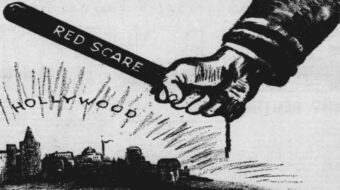
LOS ANGELES — The West Coast premiere of Paul Grellong’s intriguing academic thriller has landed at the Geffen Playhouse. This is one boat serious theatergoers will not want to miss!
Power of Sail had its maiden voyage at the Warehouse Theatre in Greenville, S.C., in 2019. Then came the strong headwinds bringing in the pirate invader Corona, and theater basically went into drydock.
Not least of the current production’s charms is the on-stage presence of Emmy & Tony Award winner, and Dalton Trumbo character, Bryan Cranston in the lead role of distinguished Harvard history professor Charles Nichols. The professor comes from five generations of British stock in America, all of them intimately connected to Harvard. Without detracting from his own intelligence and achievement, he is the very model of the modern legacy Harvard man, smug, self-assured, superior, unassailable, genetically destined to perch high in the university’s diadem of academic stars.
In the first scene of this taut, intermissionless 105-minute drama we find the professor holed up in his book-lined office hearing angry shouts from students on the quad outside. They are protesting the recently released news that as chairman of the prestigious university speakers series on “American Extremism,” Nichols has invited Benjamin Carver, a slick, young incendiary white nationalist to hold forth on a Harvard stage. His colleagues are concerned, the students are in revolt, demanding a withdrawal of the invitation. But Charles is undeterred in his devotion to “free speech,” looking forward to the opportunity to respond to his invited guest in measured, thoughtful debate rooted in the genius of American tradition that he is sure will expose and decimate his guest’s noxious thinking. “The answer to hate speech is more speech,” he claims. The students and other faculty are far from persuaded this is the best way to fight fascist ideas in America, convinced that giving the man a platform can only burnish his legitimacy. “Distinguished Guest Speaker at Harvard University”—hard to beat that!
With historical monographs behind him on the pro-Nazi German-American Bund of the 1930s behind him, as well as another on the Freedom Summer of 1964, Professor Nichols’s liberal proclivities would be difficult to refute. He is not prepared to be “subjected to a tribunal of triggered children.”
The Geffen Playhouse had invited Cranston back after 25 years with the idea that he might direct a play there. But history took a different tack. “When I first read it,” Cranston recalled in an interview about Power of Sail, “which was about this time in 2019, it was pre-pandemic, pre-BLM. Was this subject around? Yeah, of course. Was it seen? No. We hadn’t been enlightened. The process of selecting this play and bringing it to life really opened my eyes to my own blindness. I’ve lived 65 years under a certain belief system that I was taught or that I learned through my environment or education, whatever, and it belies an undercurrent of truth. That we don’t thoroughly go in and dissect the structures of how this country was created and the systemic racism that has always been there is astonishing to me.”
Title of play
Nichols has in his office a nearly completed model of an early 19th-century tall ship that he has been working on for years. He obviously is a passionate seaman, although the playwright doesn’t elaborate on the family or personal background to this pursuit, nor to any studies of nautical history that the professor may have written. The title of the play comes from nautical law: “A vessel under power of motor must grant way to a vessel under power of sail.”
The concept is clear that while all vessels have the right to be out on the water, the rule of the sea demands that the weaker one cannot be endangered by the more powerful one: A motorboat cannot so perilously approach a kayak to cause it to tip over. There’s a certain obvious justice to this law, but also a certain noblesse oblige, the sense that those more privileged do have, up to a point, at least, the duty to protect those with less. Nichols carries this sense into his teaching, where he has trained a whole new generation of students, lifting and “cleaning” some of them up. His star pupil Baxter Forrest, who grew up in Boston’s predominantly African-American Roxbury neighborhood, is one of his protégés, now gone on as a Charles Blow-type news commentator on multiple national media platforms with a book out about racial “code-switching.”
Essentially the play asks viewers to interrogate the vaunted primacy of “free speech” (hey, it’s in the First Amendment!). Do we acknowledge any limits at all to speech—beyond the proverbial shouting “Fire!” in a crowded theater? Many societies—perhaps all—lay down more stringent guidelines. We know, of course, that in theory (though lately not so much) academic free speech is of a qualitatively distinct order than streetcorner or union picketline speech, which historically could get you arrested and jailed. Or even schoolhouse and clubhouse speech, if, as in the 1950s, you’re a CPUSA member teaching the theories of Marx and Lenin. “Free speech” is not a single, simple concept equally applied everywhere—nor should it be. There are, as Baxter Forrest says, “barriers to entry to the discourse.” The question is, Who holds the power to set those limits? The GOP-dominated Supreme Court removed campaign contribution limits on the basis of corporate (read: money’s) free speech, right?

If Nichols just wants “more speech” to counter the fascists, Baxter Forrest has a different idea: “The answer to Nazis is clubs and bats.” At a time of social disintegration, which it appears the United States is experiencing now, and why the play is so excruciatingly timely, the law may not have the capacity to react quickly and decisively enough: The battle of ideas may literally have to be fought in the streets. That battle is not just between Nazis and those who still believe in democracy, but over the whole structure of law and policy itself to ensure that everyone is given fair access to the “pursuit of happiness.”
The way the play rolls out, it is clear that it’s not just the speakers symposium under Prof. Nichols that needs a democratizing overhaul, but the whole university system of weaponized privilege, and by extension, the entire society.
Each of the seven roles in Power of Sail is precision-crafted. Apart from the haughty, highly compromised Prof. Nichols, we have his fellow professor and Dean Amy Katz (Amy Brenneman), who appears the sane, sober voice of reason and peacemaking, yet who also turns out to have a questionable history. Baxter Forrest (Brandon Scott) is certainly one of the “good guys” in the play, yet is there some truth to the accusation that he’s riding the wave of the new BLM consciousness to garnish his career? Or is that just the mutterings of the white faculty and graduate students who are losing ground to this new multiracial, intersectional generation?
Nichols’s two graduate students are Maggie Rosen (Tedra Millan), who stands solidly with the protesters and is willing to employ, shall we say “special” means to ferret out the facts behind her professor’s provocative speaker invitation? After all, the professor himself has used some rather “special” methods in pursuing his own research. And Lucas Poole (Seth Numrich), still fussing to complete his dissertation on Swedish peasant life in the 17th century, but mostly distracted by video games and the latest technology—which turns out to be useful in uncovering the incriminating facts in this tightly wound scholarly thriller. Poole himself is one of those in the Nichols mold—“not of the cultural moment”—feeling challenged by the rise of new nonwhite faces in the academy. At a certain point, he wonders if academia is where he will wind up—perhaps like Newt Gingrich, with his history Ph.D., in politics.
FBI investigator Quinn Harris (Donna Simone Johnson) has one scene in which she probes Prof. Nichols about the criminal acts that have ensued flowing out of the speaker invitation. She is the clipped master of cool, surgical professionalism. She gets her man.
Frank Sullivan (Hugo Armstrong), a local bartender and more than a touch dim, also gets one scene. He’s the one member of Nichols’s pathetic “book club” who dutifully reads the professor’s tomes and also has nautical interests, having constructed a small model sailboat which he shows the professor. As Nichols examines Frank’s craftsmanship, he critiques the work as though he were refining the conceptual constructs of a doctoral student—another example of the tolerant noblesse oblige of “power of sail.”
The ensemble is expertly directed by Weyni Mengesha with a keen, nuanced attention to movement, gesture, and timbre. She has pressed all the rich juice out of this amazingly prescient script.
And a very, very special mention needs to be made of the ivy-covered scenic design by Rachel Myers. If it didn’t sound too flippant for the solemnity and importance of the play, I’d be tempted to say it’s worth seeing for the set alone, so I won’t. But it is, to be sure, a marvel of elegant invention, revolving on the turntable to reveal multiple, handsomely appointed settings. Those stagehands in the back must be very busy—and quiet—little beavers setting up each new environment as it rolls around.
In short, a bravissimo to all. This is truly what theater and the arts need to be doing now to educate, enlighten, and awaken. The insidious, incipient methodology of legal fascism that has underlain the American experiment since even before 1619 may have ripened, under the current Republican Party and its openly fascist followers, into a full-blown movement prepared to seize power in the United States in the slow coup currently happening. The threat cannot be overstated. The theater will not on its own beat it back, but it must be, and is, a partner in our united front.
Power of Sail runs through March 13 at the Geffen Playhouse. The theater is located at 10886 Le Conte Ave., Los Angeles 90024. For further information and to purchase tickets, go to the Geffen Playhouse website.
An interview with Bryan Cranston can be read here. The trailer can be viewed here.










